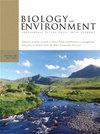Incorporating Biodiversity Considerations in Policy
IF 0.6
4区 环境科学与生态学
Q4 ENVIRONMENTAL SCIENCES
Biology and Environment-Proceedings of the Royal Irish Academy
Pub Date : 2022-01-01
DOI:10.3318/BIOE.2002.102.3.177
引用次数: 4
Abstract
We all participate in natural processes, which are facilitated by biodiversity. Changes in lifestyles, farming practices, infrastructure and the way we work and live over the last half-century or so have resulted in dramatic changes in the state of Ireland's biodiversity. The need for policy to incorporate biodiversity considerations is now more urgent than ever before because our ability to cause change is much greater. The 1998 European Community Biodiversity Strategy stated, 'Given the projected growth in economic activity, the rate of loss of biodiversity is far more likely to increase than stabilise' (Commission of the European Communities 1998). The excellent and informative Ireland's environment: a millennium report, published by the Environmental Protection Agency, also demonstrates the links between the growth of GDP and environmental pressures, rating the need to protect our natural resources as an urgent priority (Stapleton et al. 2000). The International Union for the Conservation of Nature (IUCN) has produced an important evaluation in a global context of Ireland's performance in biodiversity protection. Ireland is listed by the IUCN and the Organisation for Economic Cooperation and Development (OECD 1996) as the worst achiever in the OECD, protecting the smallest amount of national territory for biodiversity of all 28 developed nations. In fact, Ireland protects only about 1% of the national territory to strict intemational standards (that is, with national parks, nature reserves and other such stricdly protected areas) (OECD, updated to the year 2000), whereas the average in the developed world is 12% of the national territory (OECD 1996). Special areas of conservation (SACs) and natural heritage areas (NHAs) are not included in these figures because they are not accorded strict protection. Because of the small percentage of national parks and nature reserves in Ireland, NHAs and SACs are at the forefront of the measures that will be put in place to ensure nature conservation and must be carefully managed to maximise their contribution to biodiversity. Support is required, however, from a wide range of other policies, so that protected areas do not become 'islands' in a bio-monoculture. Despite the lack of coverage of national parks and nature reserves, the Minister for Arts, He itage, Gaeltacht and the Islands recently将生物多样性考虑纳入政策
我们都参与了由生物多样性促进的自然过程。在过去半个世纪左右的时间里,生活方式、农业实践、基础设施以及我们工作和生活方式的变化,导致了爱尔兰生物多样性状况的巨大变化。现在比以往任何时候都更迫切需要制定将生物多样性考虑在内的政策,因为我们引起变化的能力要大得多。1998年欧洲共同体生物多样性战略指出,“鉴于经济活动的预期增长,生物多样性丧失的速度更有可能增加而不是稳定”(欧洲共同体委员会,1998年)。环境保护署出版的《爱尔兰环境:千年报告》也展示了国内生产总值的增长与环境压力之间的联系,将保护自然资源的需要列为当务之急(斯台普顿等人,2000年)。国际自然保护联盟(自然保护联盟)在全球范围内对爱尔兰在生物多样性保护方面的表现进行了重要评估。爱尔兰被世界自然保护联盟和经济合作与发展组织(OECD, 1996)列为经济合作与发展组织中成绩最差的国家,在所有28个发达国家中保护生物多样性最少的国家领土。事实上,按照严格的国际标准(即国家公园、自然保护区和其他严格的保护区),爱尔兰只保护了大约1%的国家领土(经合组织,更新至2000年),而发达国家的平均水平是国家领土的12%(经合组织,1996年)。特别自然保育地区及自然遗产地区因未获严格保护,故不包括在上述数字内。由于爱尔兰国家公园和自然保护区的比例很小,国家公园和自然保护区将处于确保自然保护的措施的最前沿,必须仔细管理,以最大限度地提高它们对生物多样性的贡献。然而,需要其他广泛政策的支持,这样保护区才不会成为单一生物栽培中的“孤岛”。尽管缺乏国家公园和自然保护区的覆盖,但艺术、爱尔兰、爱尔兰和群岛部长最近
本文章由计算机程序翻译,如有差异,请以英文原文为准。
求助全文
约1分钟内获得全文
求助全文
来源期刊
CiteScore
1.10
自引率
0.00%
发文量
6
审稿时长
>36 weeks
期刊介绍:
The journal aims to offer a broad coverage of the subject area, including the following:
- biology and ecology of the Irish flora and fauna
- microbial ecology
- animal, plant and environmental physiology
- global change
- palaeoecology and palaeoclimatology
- population biology; conservation of genetic resources
- pollution and environmental quality; ecotoxicology
- environmental management
- hydrology
- land use, agriculture, soils and environment.
Submissions on other relevant topics are also welcome, and papers of a cross-disciplinary nature are particularly encouraged.

 求助内容:
求助内容: 应助结果提醒方式:
应助结果提醒方式:


